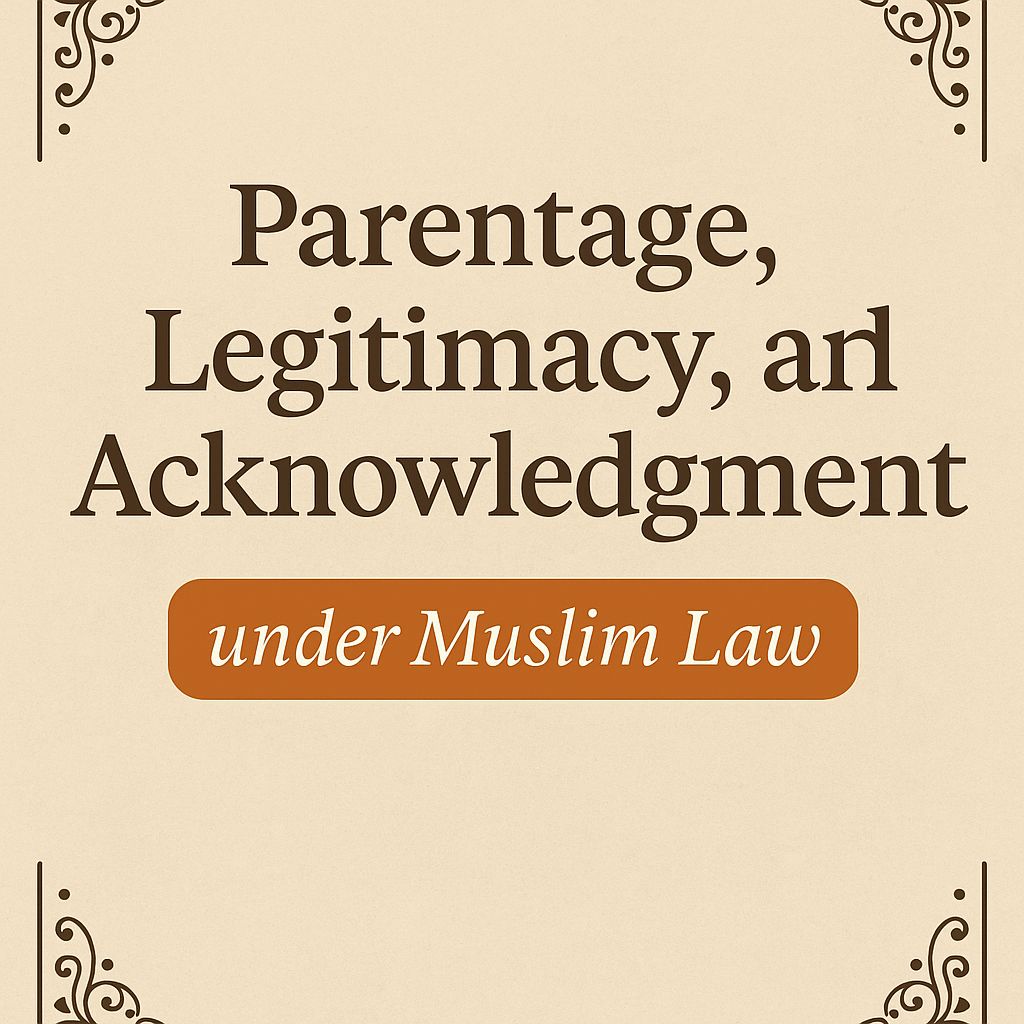 Parentage, Legitimacy, and Acknowledgment under Muslim Law
Parentage, Legitimacy, and Acknowledgment under Muslim Law
Meaning of Parentage
Parentage is the legal relationship between parents and their children.
• Maternity refers to the legal relation of the mother and child.
• Paternity refers to the legal relation of the father and child.
These legal relationships carry mutual rights and duties, such as:
• Inheritance
• Maintenance
• Guardianship
Maternity: How Established
Under Sunni Law
• Maternity is established by birth alone, regardless of whether the child is born within marriage or through zina (adultery).
Under Shia Law
• Mere birth is not sufficient.
• It must be proved that the child was born out of a lawful marriage.
Paternity: How Established
• Paternity can only be established through marriage between the parents.
• The marriage may be valid or irregular, but it must not be void.
• Paternity is attributed to the husband of the mother.
Legitimacy under Muslim Law
Legitimacy is closely linked to lawful wedlock.
A child is considered legitimate only if:
• Born in a valid marriage.
• Both father (begetter) and mother (bearer) were legally married at the time of conception.
Hence, direct or indirect marriage between the parents is necessary to establish legitimacy.
Presumption of Legitimacy: Key Rules
1. Child born within 6 months of marriage
→ Illegitimate, unless acknowledged by the father.
2. Child born after 6 months of marriage
→ Presumed legitimate, unless disclaimed by father through Lian.
3. Child born after dissolution of marriage
• Shia Law: Legitimate if born within 10 lunar months.
• Hanafi Law: Legitimate if born within 2 lunar years.
• Shafei & Maliki Laws: Legitimate if born within 4 lunar years.
Section 112 – Indian Evidence Act: Conclusive Presumption
“A person born during a valid marriage, or within 280 days after its dissolution, is conclusively presumed to be the legitimate child of the husband, unless it is shown that the husband had no access to the wife during the period of conception.”
Judicial Views
• D.F. Mulla: Evidence Act supersedes Muslim law.
• Ameer Ali: Section 112 embodies English law and doesn’t override Muslim law.
• Tyabji: Disagrees with Ameer Ali.
• In A.G. Ramchandran v. Shamsunnisa Bibi (AIR 1978 Madras): Section 112 applies to all religions, including Muslims.
Acknowledgment of Paternity under Muslim Law
When direct marriage cannot be proven, acknowledgment can establish paternity.
Conditions for Valid Acknowledgment:
1. Must acknowledge legitimate sonship, not merely sonship.
2. Acknowledger must be at least 12.5 years older than the child.
3. Child must not be known to be someone else’s child.
4. If the child is adult, he/she must consent or remain silent.
5. There must be a possibility of lawful marriage between the man and the child’s mother at time of conception.
6. Acknowledger must be adult and sane.
7. Acknowledgment must have clear intention to confer legitimacy.
8. Acknowledgment must be definite (saying “I raised this child” is not enough).
9. Once acknowledged, it cannot be revoked.
Rights Conferred:
• Child gains full legal rights of inheritance.
• Mother gains status of legal wife and right to inherit.
Acknowledgment vs. Adoption
Muslim Law does not recognize adoption.
(Refer: Mohd. Allahdad Khan v. Mohd. Ismail, 1888)
Acknowledgment under Muslim Law is based on the concept of actual paternity, meaning the man acknowledges a child as his biological and legitimate offspring. This process is valid only when the child is not known to be someone else’s child. If the biological father of the child is known and is someone else, acknowledgment is not permitted. Also, in acknowledgment, there is no renunciation of the natural family—the child remains affiliated with the natural bloodline. It relies on the theory of actual descent by legitimate means. Both male and female children can be acknowledged, and there is no religious or spiritual motive behind it; it is purely a legal recognition of parentage.
In contrast, adoption under Hindu Law is based on legal affiliation, not on biological connection. A child can be adopted even if their biological father is known, and upon adoption, the child is permanently separated from their natural family and becomes a part of the adoptive family. This is a legal fiction rather than a natural relationship. Traditionally, adoption was allowed only for sons, but after the enactment of the Hindu Adoptions and Maintenance Act, 1956, even daughters can be adopted. Earlier, adoption had a religious and spiritual motive, especially to perform rituals like shraddha, but now it can be done for secular purposes as well.
Conclusion
In Muslim Law, legitimacy, parentage, and acknowledgment are interlinked with marriage. While adoption is not allowed, acknowledgment serves as an alternative mechanism to recognize and legitimize parentage, ensuring legal and social rights to children and their mothers.
Start Your Preparation with TOA
At Theory of Abrogation, we equip you with everything you need:
•Subject-wise expert classes
•Mock test series
•Legal current affairs
•Personalized mentorship for interview preparation
“Your law degree is your foundation, but your preparation is what will build your success.”
Join Our New Batch Now!
Prepare smart. Prepare with Theory of Abrogation.
Contact Us:
📍 B-109, Commercial
Complex Dr. Mukherjee
Nagar, Delhi-09
📞 +91 9971399324 | +91 8840961324
📧[email protected]
